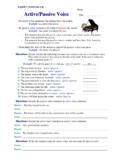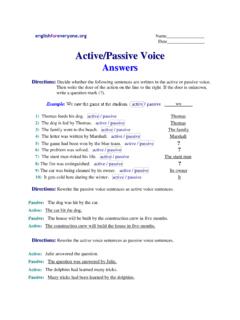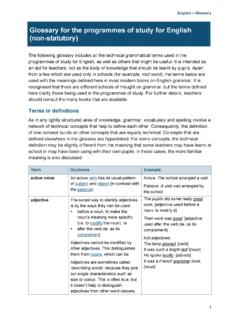Transcription of Globish The World Over - jpn-globish.com
1 1. Globish The World Over 2009 Jean-Paul Nerri re and David Hon This book is owned by the writers. Any unauthorized copying in any media, including posting on the Internet or distributing by other means, is forbidden and protected under international copyright provisions. US Copyright Registry Case #1-206193066. ISBN 978-2-212-86542-4. Books available in e-book at and in paperbound at Table of Contents Part 1 The Problem with Learning english Chapter 1 Many, Many Languages Chapter 2 Esperanto vs the World ? Chapter 3 Thinking Globally Chapter 4 The Native Speakers' Edge is Their Problem Chapter 5 The english Learners' Problem is Their Edge Chapter 6 The Value of a MiddleGround Chapter 7 The Beginnings of Globish 2. Chapter 8 Is Globish More Useful than english ? Chapter 9 A Tool and A Mindset Chapter 10 Globish in Many Places Part 2 Elements of Globish Chapter 11 How much is enough ? Chapter 12 Is Globish the Same as english ?
2 Chapter 13 How Globish is Different from english Chapter 14 Natural Language Has Experience . Chapter 15 A Closed System: Globish Limitations Chapter 16 1500 Basic Words Chapter 17 1500 Basic Globish Words Father 5000. Chapter 18 Cooking with Words Chapter 19 Say No to Most Figurative Language Chapter 20 Globish Best Practices . Chapter 21 Critical Sounds for Global Understanding Chapter 22 Globish in Texting? Chapter 23 When Globish Arrives Appendix 140. Obama's Inauguration Address in english & Globish 3 of 137 Pieces in World Press Partial Resources Meet the Writers (Web Sites with additional Globish Information). 3. #1 (Sample: Early part of Globish The World Over). Today, the communication problem is the same. Just the scale is different. A century ago, their World was their country. Now their World is . much more. Most people now speak a local language which is often their national language.
3 Now they must communicate to the whole globe. (From english Next). In this World , teachers say there are more than 6000 languages. In 45. countries, english is an official language. But not everyone speaks english , even where it is an official language. Only 12% of the global World has english as a mother tongue. For 88% of us, it is not our first language, our mother tongue. We know that only 4% of international communication is between native speakers from different english -speaking nations - like Americans and Australians. So 96% of the international english communication takes place with at least one non-native speaker. Next sample will be from another part of the book. 4. #2 (Sample: Later part of Globish The World Over). because they are the easiest words they both know. Of course, these are not always those of the native speakers, who have so many more words to choose from. The idea of Globish came from this observation: limitations are not always a problem.
4 In fact, they can be useful, if you understand them. Jean-Paul Nerri re could see that if we can make the limitations exactly the same, it will be as if there are no limitations at all . He decided to record a limited set of words and language that he observed in most non- english speakers. He then suggested that people from various mother tongues can communicate better if they use these carefully chosen limitations. Globish is that common ground.. This theory of limitations is not as strange as it might seem at first. Most human activities have some limitations. The World Cup is one of the most-watched competitions in the World , because its set of limitations makes it a great game for everyone. In Next sample will be from another part of the book. 5. #3 (Sample: Middle part of Globish The World Over). Strangely, many native english speakers still believe they can do all things better than non-native speakers just because they speak better english .
5 How long will it take for them to understand that they are wrong? They have a problem that they are not able to understand. They do not see that many non-native speakers simply cannot understand them. This does not mean the native speaker's english is bad. It means that their communication is bad; sometimes they do not even attempt to make their communication useful to everyone. Often they don't know how. We want everyone to be able to speak to and understand everyone. There is a middle ground, but the native english speakers are not the ones drawing the borders. And because you may not be able to say this to a native speaker, who might not be able to understand we will say it here. To belong to the international community, a native english speaker must: understand . what is explained in this book, accept . that it is the fact of a new World which has many new powers that will be as strong as the english -speaking countries, decide to change with this new reality, in order to still be a member.
6 6. Whenever a native english speaker acts as if you are the stupid one, please give them this book. If they choose to take no notice of their problem, they will be left out of communication. They will be left out of activities with others worldwide if they do not learn to limit the way they use their language. english speakers need to limit both spoken and written english for communication with non-native english speakers. In short, they too need to learn Globish . It is not an easy exercise, but it can be done. Some of this book will help them. Globish has a special name It is very important that the Globish name is not english for the World or even Simple english . If its name were any kind of english , the native english speakers would say. OK, we won. Now all you have to do is speak better english . Without the name Globish , they will not understand it is a special kind of english , and it is no longer their english .
7 Most native english speakers who understand this should decide they like it. Hopefully they will say: Now I understand that I am very lucky. Now my language will be changed a little for the rest of the World . Let me do my best, and they can do their best, and we will meet in the middle.. So Globish is a word that tells native english speakers and non- native speakers that Globish has a different meaning. Next sample will be from another part of the book. 7. #4 (Sample: Middle part of Globish The World Over). But the question will always be asked: What does enough . mean? What is enough? Not enough means that you cannot communicate comfortably with anyone, in english or Globish . You may not know enough words or more likely you do not say words with the right stresses, or you may not know simple sentence forms and verb forms. So how much is too much? . Too much makes many students learning english feel they will never be good enough in english .
8 The Council of Europe offers a Common European Framework of Reference for Languages ( ) that offers a situational test for users of all second languages. By their standard, the best user of Globish would be an Independent User (Their category called B1 ) THIS IS GIVEN EXACTLY IN 's english : Can understand the main points of clear standard input on familiar matters regularly encountered in work, school, leisure, etc. Can deal with most situations likely to arise whilst travelling in an area where the language is spoken. Can produce simple connected text on topics, which are familiar, or of personal interest. Can describe experiences and events, dreams, hopes & ambitions and briefly give reasons and explanations for opinions and plans. That is the test for enough for their B1 - Independent User. It would be enough for the Globish user too, if we added this: Next sample will be from another part of the book.
9 8. #5 (Sample: Last parts of Globish The World Over). Also allowed are (a) Names and Titles - (capitalized), (b). international words like police and pizza, (c) technical words like noun and grammar in this book. Only common agreement between speakers can decide between them, of course, what other words to allow beyond these 1500 Globish words. If one person cannot understand an additional word, then its use is not recommended. (See Chapters 16 and 17). Globish uses mostly Active Voice Globish speakers should understand Passive and Conditional forms. But it is usually best for Globish users to create messages in Active Voice if possible. Who or what is doing the action must be clear in Globish . english may say: The streets were cleaned in the morning. But Globish would say (See Chapter 18): The workmen cleaned the streets in the morning. Globish pronunciation has fewer necessary sounds than traditional english Globish sounds should be learned with each word.
10 Most important: Globish must use syllable stress VEry corRECTly. 9. #6 (Sample: Last parts of Globish The World Over). the word workman, we can just say What kind of man? A. workman . If the words are only one syllable, you stress the first syllable. Here are some of those combined words: work + man = workman bed + room = bedroom class + room = classroom day + time = daytime week + end = weekend home + work = homework man + kind = mankind air + plane = airplane street + car = streetcar Adding a few letters to the front or the back of a word All of them are called Affixes. There are two basic kinds of affixes. The ones on the front of the word called Prefixes. The ones on the end of the words are called Suffixes. Next sample will be from another part of the book. 10. #7 (Sample: Last parts of Globish The World Over). be at broadly-understood level. If you have a) a small number of most-used words, like the Globish 1500, and b) simple grammatical forms, you can easily use texting.







